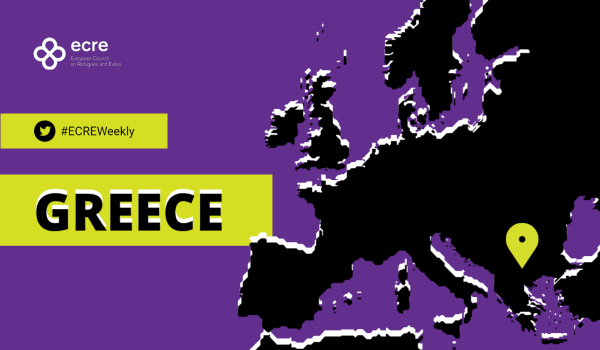Greece systematically fails to identify survivors of modern slavery among asylum seekers, leaving them at high risk of being re-subjected to abuse. Greek Migration Minister continues to deny allegations of pushbacks while admitting “interception” of boats amid ongoing reports of pushbacks to Türkiye. The 24 Humanitarians who were on a “farcical trial” might be sent back for a retrial.
ECRE member Fenix Humanitarian Legal Aid underlined in its submission to the UN Special Rapporteur on Contemporary Forms of Slavery (CFS) that Greece systematically fails to identify survivors of modern slavery among asylum seekers, leaving them at high risk of being re-subjected to abuse. In particular, the organisation points out that the abolishment of shelters and a lack of investment in safe housing options leave many asylum seekers who have survived CFS in detention-like campsat a high risk of ending up in situations of destitution or homelessness. They say: “survivors who do get access to a shelter will often only be able to stay there temporarily, after which they also must return to the camps”. This makes them more vulnerable to becoming a target of new CFS schemes. Meanwhile, the European Court of Human Rights (ECtHR) ruled in a case concerning the living conditions of a woman asylum seeker who gave birth in Samos and was later transferred to the mainland where living conditions were substandard. The court found that Greece violated Article 3 of the European Convention on Human Rights which prohibits torture or inhumane or degrading treatment, confirming once again that the living conditions for asylum seekers, and pregnant women in particular, are unacceptable. In addition to that, refugee women from Afghanistan living in different camps in mainland Greece describe “life on the sidelines, cut off from Greek society and support structures based in urban centres”. According to Refugee Support Aegean (RSA), the refugee women reported about the financial and practical obstacles they face to leave the camps and reach services based in the cities, lack of information and orientation and undignified situations in public transportation. A voluntary scheme by Member States to accept unaccompanied migrant children from Greece officially ended despite the high number of unaccompanied minors in Greece enduring an “extremely difficult” situation. Meanwhile, the Racist Violence Recording Network (RVRN) recorded 74 incidents of racist violence in Greece in 2022 including 33 incidents where migrants, refugees or asylum-seekers were targeted due to their national origin, religion or colour. The network underlined that such incidents of racist violence are underreported.
Greek Migration Minister, Notis Mitarachi, continues using “an innovative mix of misdirection and outright lies” to cover up his government’s cruel practices towards people on the move. Mitarachi said in a recent interview with German media Der Bild: “We don’t do pushbacks. But we intercept people at sea. I am fully aware of this and I am fully convinced that this is consistent with the legal framework of the European Union”. The minister previously communicated that the Greek police prevented 260,000 people from entering the Evros without clarifying how. “Mitsotakis’ government not only carries out pushbacks, they are its sole policy regarding people seeking safe places to live, learn and work. We must also state that in common with many politicians across the world, Mitsotakis’ policy is simply to lie to journalists, and wait for them to publish his lies verbatim”, Koraki outlet stated. ECRE member Geek Refugee Council (GRC) in a report underlined that pushback operations are “not isolated incidents, but an unofficial migration and border policy implemented by Greek state actors and their auxiliaries”. Meanwhile, Aegean Boat Report reported on 19 April that masked men, described as the shadow army, pushed back a boat carrying approximately 30 people to Türkiye, leaving them “helplessly drifting in the middle of the sea”. On the same day, a woman was shot dead on the North Macedonian border with Greece during a vehicle inspection. “The price of bigotry is paid by other people. In this case, a young woman who had done nothing wrong, paid for it with her life”,Koraki stated 26 boats carrying 902 people were pushed back from the Aegean between 10-16 April to Turkey, the organisation reported. On 20 April, a shipwreck occurred in a remote coastal area of the Greek mainland left one migrant dead and 47 were rescued.
Meanwhile, the crackdown solidarity persists. The persecution reportedly made an appeal to the Supreme Court concerning the 24 humanitarians who were on a “farcical trial” for assisting people drowning in the sea. If the appeal is accepted, the 24 rescue volunteers could be sent back to court for a retrial. ECRE member Fenix Aid said “While the statute of limitations on these accusations had run out, if the appeal is accepted, the statute of limitations will be extended up to three years. This sends the 24 humanitarians into yet another period of legal limbo, all because they saved lives.”
For further information:
- ECRE, Greece: Inadmissibility Decisions Continue – Türkiye Increasingly Unsafe, Decrease of Asylum Seekers in Greece as Pushbacks Continue, 7 April 2023
- ECRE, Greece: Situation Worsening for Refugees as EU-Turkey Deal Passes Seventh Anniversary, Frontex Beef up Cooperation on Return Amid MEP Scrutiny Over Violations, Crack-down on Human Rights Defenders Continues, 24 March 2023
This article appeared in the ECRE Weekly Bulletin. You can subscribe to the Weekly Bulletin here.

